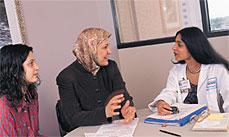 ocial
workers have been instrumental in caring for thousands of M. D. Anderson
patients and their families since 1947, helping them to cope more
effectively with life changes that often occur with a cancer diagnosis. ocial
workers have been instrumental in caring for thousands of M. D. Anderson
patients and their families since 1947, helping them to cope more
effectively with life changes that often occur with a cancer diagnosis.
 As
an integral part of the health care team, the institution’s
38 licensed social workers serve more than 30,000 patients a year
and are assigned to various inpatient and outpatient areas throughout
the center. As
an integral part of the health care team, the institution’s
38 licensed social workers serve more than 30,000 patients a year
and are assigned to various inpatient and outpatient areas throughout
the center.
 “In
the Department of Social Work, our mission is to eliminate the psychosocial
barriers to cancer care,” says Margaret Meyer, director of
the department. “To be an effective social worker at M. D.
Anderson, one needs to be a team player, have many skills and be
able to handle multiple tasks in order to ensure a smooth transition
for our patients through the continuum of care.” “In
the Department of Social Work, our mission is to eliminate the psychosocial
barriers to cancer care,” says Margaret Meyer, director of
the department. “To be an effective social worker at M. D.
Anderson, one needs to be a team player, have many skills and be
able to handle multiple tasks in order to ensure a smooth transition
for our patients through the continuum of care.”
 Lakshmi
Naik, senior social work counselor, adds, “It’s important
to understand that patients’ psychosocial circumstances and
ability to cope have a great impact on their treatment and care,
regardless of their financial wellness. The earlier we see patients,
the better equipped they will be to move through the care system
and will less likely encounter avoidable crises.” Lakshmi
Naik, senior social work counselor, adds, “It’s important
to understand that patients’ psychosocial circumstances and
ability to cope have a great impact on their treatment and care,
regardless of their financial wellness. The earlier we see patients,
the better equipped they will be to move through the care system
and will less likely encounter avoidable crises.”
 On
any given day, social workers assess patients’ ability to cope
with their disease, identify barriers to treatment, provide short-term
and crises-oriented counseling, conduct support group meetings and
relaxation exercises, and help patients access community resources. On
any given day, social workers assess patients’ ability to cope
with their disease, identify barriers to treatment, provide short-term
and crises-oriented counseling, conduct support group meetings and
relaxation exercises, and help patients access community resources.
 In
coordination with case managers, they also assist with discharge
planning, whether that involves hospice counseling, sending a patient
home with provider services, or facilitating a patient’s transition
from the hospital to an outside facility, such as inpatient hospice,
a nursing home or a rehabilitation center. To round out the day,
their expertise often is called upon to provide insight into ethical
concerns and other patient issues. In
coordination with case managers, they also assist with discharge
planning, whether that involves hospice counseling, sending a patient
home with provider services, or facilitating a patient’s transition
from the hospital to an outside facility, such as inpatient hospice,
a nursing home or a rehabilitation center. To round out the day,
their expertise often is called upon to provide insight into ethical
concerns and other patient issues.
|

| Lakshmi Naik (right),
a senior social work counselor, talks with patient Rugia Othman
of Abu-Dhabi (center) and her daughter, Hadeel Alqadi, about
their cancer experience, adjustment to the disease and problems
of living in another country. |
|
